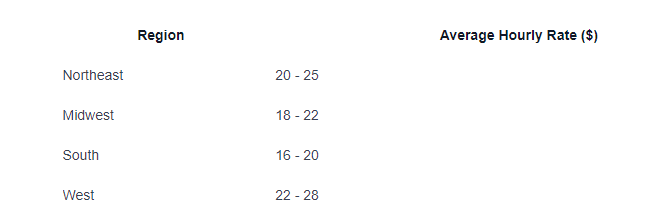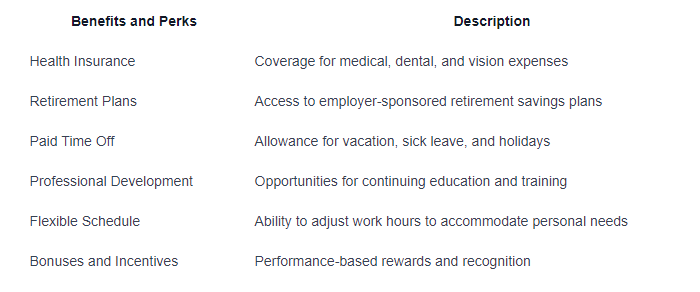Autism Behavior Technician Salary: Hourly Rate
Unveiling the truth behind autism behavior technician salary. Discover hourly rates and industry insights for a rewarding career.


Understanding Autism Behavior Technician Salary
Autism Behavior Technicians play a vital role in supporting individuals with autism spectrum disorder (ASD) and assisting them in developing essential skills and behaviors. As these professionals are critical to the well-being and progress of individuals with ASD, understanding the factors that influence their salary rates is essential.
Importance of Autism Behavior Technicians
Autism Behavior Technicians are highly valued members of the healthcare and education sectors. They work directly with individuals with ASD, implementing behavior intervention plans, providing therapy, and supporting skill development. Their contribution is crucial in helping individuals with ASD achieve their full potential and improve their quality of life.
Autism Behavior Technicians work under the supervision of Board Certified Behavior Analysts (BCBAs) and collaborate with other professionals to create and implement effective treatment plans. They play a significant role in promoting positive behaviors, reducing challenging behaviors, and enhancing communication and social skills in individuals with ASD.
Factors Influencing Salary Rates
Several factors influence the salary rates of Autism Behavior Technicians. Understanding these factors can help both professionals and employers determine appropriate compensation. Some of the key factors include:
- Education and Certification: The level of education and certification obtained by Autism Behavior Technicians can impact their salary rates. Professionals with higher education levels and specialized certifications often command higher salaries.
- Experience: Years of experience working as an Autism Behavior Technician can also influence salary rates. Professionals with more experience may be eligible for higher compensation due to their expertise and demonstrated skills.
- Geographic Location: Salary rates can vary significantly based on the geographic location. Factors such as the cost of living, demand for Autism Behavior Technicians, and regional economic conditions can impact the compensation offered.
- Industry and Sector: Autism Behavior Technicians can work in various settings, including educational institutions, healthcare facilities, and private clinics. The industry and sector in which they work can affect salary rates.
By considering these factors, employers can establish competitive salary ranges, and professionals can gain an understanding of the expected compensation in their field. It is important to note that salary rates may also be influenced by market demand and other external factors.
Understanding the importance of Autism Behavior Technicians and the factors that influence their salary rates is essential for both professionals and employers. With this knowledge, individuals can make informed decisions about their career paths and compensation expectations.
Average Hourly Rates
When considering a career as an autism behavior technician, understanding the average hourly rates can provide valuable insights into the compensation landscape. The hourly rate for autism behavior technicians can vary based on several factors, including location, experience, and certifications.
National Average Hourly Rate
The national average hourly rate for autism behavior technicians is influenced by various factors, including demand, cost of living, and regional disparities. According to available data, the national average hourly rate for autism behavior technicians is approximately $18 to $25 per hour.
It's important to note that the national average serves as a general benchmark, and actual rates may vary depending on specific circumstances. Factors such as the technician's qualifications, experience, and the organization they work for can impact their individual hourly rate.
Regional Disparities in Hourly Rates
Autism behavior technician hourly rates can also vary significantly based on the geographical location. Factors such as local market demand, cost of living, and state-specific regulations can influence the regional disparities in hourly rates.
To provide a general overview, the table below illustrates the range of hourly rates for autism behavior technicians across different regions in the United States:

It's important to remember that these figures represent approximate ranges and should not be considered definitive. The specific hourly rate for an autism behavior technician in a particular region may vary based on local factors, including supply and demand dynamics, cost of living, and other market forces.
Understanding the average hourly rates, both nationally and regionally, can assist individuals in making informed decisions regarding their career choices and compensation expectations as autism behavior technicians.

Qualifications and Experience
When it comes to the salary of an autism behavior technician, qualifications and experience play a significant role in determining the hourly rate. Let's explore how certification and years of experience can impact the salary of these professionals.
Impact of Certification on Salary
Obtaining certification as an autism behavior technician can have a positive impact on the salary of individuals in this field. Certification demonstrates a higher level of expertise and competence, which is valued by employers. With certification, professionals may be eligible for higher hourly rates compared to those without certification.
Certification programs often require completion of specific coursework and passing an examination to validate the technician's knowledge and skills in working with individuals with autism. This added level of qualification can provide professionals with a competitive edge and increase their earning potential.
Effect of Years of Experience
Years of experience also play a significant role in determining the salary of autism behavior technicians. As professionals gain more experience in the field, they develop a deeper understanding of the unique needs of individuals with autism and become more proficient in implementing effective behavioral interventions.
With increased experience, technicians often demonstrate a higher level of competence and may be entrusted with more complex cases. This level of expertise can be reflected in higher hourly rates. Additionally, professionals with more experience may be sought after by employers, which can lead to negotiation power for higher salaries.
Employers recognize the value of experienced professionals who have a track record of successfully working with individuals with autism. They understand that these technicians bring a wealth of knowledge and skills to the table, which can contribute to better outcomes for their clients.
To provide a clearer understanding of the impact of qualifications and experience on salaries, the table below presents a range of hourly rates based on these factors:

It's important to note that these ranges are approximate and can vary depending on factors such as location, demand, and specific employer policies. However, they provide a general idea of the potential salary progression based on qualifications and experience.
Understanding the impact of certification and years of experience can help autism behavior technicians navigate their career paths and make informed decisions to enhance their earning potential. By continually expanding their knowledge, acquiring certifications, and gaining valuable experience, professionals can position themselves for higher hourly rates within the field.
Industry Insights
When it comes to autism behavior technician salaries, it's important to stay informed about the latest industry trends and job growth. Understanding the current landscape can provide valuable insights into salary rates and the demand for these professionals.
Trends in Salary Rates
The salary rates for autism behavior technicians have seen an upward trend in recent years. As awareness about autism and the importance of early intervention continues to grow, the demand for skilled professionals in this field has increased. This demand, in turn, has led to improved compensation for autism behavior technicians.
The table below provides an overview of the average hourly rates for autism behavior technicians in different regions:

Please note that these figures are approximate and can vary based on factors such as experience, qualifications, and specific job requirements. Additionally, it's important to consider that factors like cost of living can influence salary rates in different regions.
Job Growth and Demand
The field of autism behavior therapy has experienced significant growth in recent years. As the prevalence of autism spectrum disorders continues to rise, so does the demand for qualified professionals who can provide effective interventions and support for individuals with autism.
The demand for autism behavior technicians is expected to remain high in the coming years. According to the U.S. Bureau of Labor Statistics, the employment of behavior technicians is projected to grow much faster than the average for all occupations.
This growth can be attributed to various factors, including increased awareness, changes in healthcare policies, and the recognition of the effectiveness of applied behavior analysis (ABA) therapy in improving the lives of individuals with autism.
As the demand for autism behavior technicians continues to rise, it's crucial for professionals in this field to stay updated with the latest research, techniques, and certifications. By doing so, they can position themselves for better career opportunities and potentially higher salaries.
Understanding the trends in salary rates and job growth can help autism behavior technicians make informed decisions regarding their career paths. By staying abreast of industry developments, professionals in this field can maximize their earning potential and contribute to the betterment of individuals with autism.

Negotiating Salary
When it comes to the autism behavior technician salary, it's important for professionals in this field to understand the strategies for negotiating their hourly rates. By employing effective negotiation techniques and considering the benefits and perks offered, individuals can potentially secure a more favorable compensation package.
Strategies for Negotiating Hourly Rates
Negotiating your hourly rate as an autism behavior technician requires careful consideration and preparation. Here are some strategies to help you navigate this process:
- Research and Market Analysis: Before entering into salary negotiations, conduct thorough research on the current market rates for autism behavior technicians in your area. This information can provide you with an understanding of the prevailing rates and empower you during negotiations.
- Highlight Your Qualifications: Emphasize your qualifications, certifications, and relevant experience during salary discussions. Demonstrating the value you bring to the role can strengthen your position and potentially justify a higher hourly rate.
- Showcase Your Track Record: Highlight your accomplishments and successes in working with individuals with autism. Providing concrete examples of the positive impact you have made can make a compelling case for a higher salary.
- Be Flexible: While it's important to have a target hourly rate in mind, be open to negotiation and consider other factors beyond just the monetary compensation. Additional benefits or flexible work arrangements may be negotiable and can enhance the overall value of the compensation package.
- Practice Effective Communication: Clearly articulate your skills, experience, and the contributions you can make to the organization. Be confident, professional, and assertive in expressing your salary expectations.
Understanding Benefits and Perks
In addition to negotiating the hourly rate, it's crucial to consider the benefits and perks offered as part of the overall compensation package. These factors can significantly impact the value of your employment. Examples of benefits and perks that may be offered to autism behavior technicians include:

Understanding the benefits and perks available can help you evaluate the overall compensation package beyond just the hourly rate. Consider the importance of these additional offerings and how they align with your personal and professional goals.
Negotiating salary as an autism behavior technician requires a strategic approach and an understanding of the market rates, your qualifications, and the value you bring to the role. By effectively advocating for yourself and considering the benefits and perks, you can work towards securing a favorable compensation package that recognizes your skills and expertise in the field.
Sources
https://www.ziprecruiter.com/Salaries/Autism-Behavior-Technician-Salary
https://www.indeed.com/cmp/Autism-Spectrum-Therapies/salaries/Behavior-Technician/California
https://www.abtaba.com/blog/autism-behavior-technician-salary
Similar articles
We’re here to help you

Our team is here to assist you in this process. Contact us for any assistance.
it’s easy to apply
We Accept Most Insurances
Our in-network insurance partnerships make ABA therapy more accessible to families throughout our service areas.







Our Insurance Process
We'll request your insurance details to help us verify your plan's coverage for ABA therapy. Once we've received this information, we'll walk you through your benefits, including copayments, deductibles and out-of-pocket maximums, so you know what to expect in advance.
Our team will then handle the preauthorization and all the necessary paperwork.
.svg)




















.jpeg)


































.jpeg)




.jpeg)







.jpeg)











.jpeg)
















